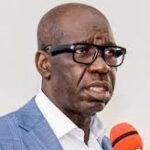Tejumola Abisoye, a lawyer with experience in development finance, project management and monitoring and evaluation, is the Executive Secretary of Lagos State Employment Trust Fund (LSETF), an agency set up by an act of the Lagos State House of Assembly in 2016 to address unemployment via job creation, promotion of entrepreneurship opportunities and skills acquisitions among others. In this interview, she speaks on challenges facing businesses, among others.
To what extent has the agency been able to meet its mandate? How many job opportunities have you created and how many entrepreneurs have you supported so far?
Our impact is really about job creation. So regardless of whatever we do, or the activities that we get involved in, we are looking at it from how does this create jobs? How does this empower people? How does this make sure that people are meeting their aspirations? So today, we’ve been able to enable the creation of over 200,000 jobs by supporting Micro Small and Medium Enterprises (MSME) development in Lagos State. Our flagship programme is what we call our access to finance, affordable finance facilities for MSMEs. The idea is for them to be able to access loans without having to do collateral and at a rate that makes them able to plug in money to that business. With regards to that access to finance, we’ve been able to do close to 13,000 businesses across Lagos; but in addition to the loans, we also provide other supports such as legal advisory, financial advisory, human resource advisory to businesses because not all our businesses need money. We found out that there are more issues around capacity development, and we’ve been able to support about 34,000 businesses in that respect. Another programme that we’ve been able to do successfully is also provide grants to already existing and very sustainable businesses.
Cooperative society donates start-up capital to women
Needed growth in economic and agricultural sector
We also have CARES grant, which is the Lagos State COVID Action Recovery Economic Stimulus programme. This provides grants to existing and sustainable businesses to cushion the effect of COVID or other events that may have happened or could affect their ability to create jobs. Today, we’ve been able to support over 4,000 in that regard and sustained over 100,000 jobs with all the grants programmes.
Does the agency do any form of follow-up to ensure that beneficiaries of its interventions remain in business and what criteria are considered before intervention?
We have a very robust monitoring and evaluation programme and we say this carefully because that’s the only way you’re actually able to come to the conclusion that your interventions are actually providing results.
We have reports where people who get grants have gone through further programmes to see where they are, what they have done and how they use the funds. The same thing with the loans because you have to see how many jobs have been created, where are they? What are they still struggling with and where can we come in to help them? However, I think the most important thing is how do we even select the businesses that we support?
For our loan programme, the primary thing is that you have to be a Lagos resident, your business has to be based in Lagos, you need to be creating the jobs in Lagos State. So, we always insist that you provide your Lagos State Residents Registration (LASRRA) Identification number. The second thing is that you must have your Tax ID because these funds are taken from taxpayers’ money and you have to be contributing to that pool.
We started in 2016 and at a subsidized rate of 5 percent, and that idea really was to make sure that the interest businesses were paying does not have to break the bank, but they can also make margin that they can plug back into the expansion of the business. We are now at nine per cent and we are very careful about the selection process. The truth is that we do have defaulters, regardless of how well you review or assess the loan applications but we also find that it’s because it’s a government intervention and they feel more comfortable postponing the payment to the government. Our priority however is that they are existing and they’re creating jobs, though, we want to collect the money because we want to be able to give it to other people. So, we say ‘come and renegotiate your payment terms’, we are happy to have these kinds of conversations but we also recognize that there are people who don’t intend to pay back at all and they don’t even want to have conversations about repayments and negotiations. So, we take people like that to court, we use recovery agents, but we stay within the ambit of the law. The highest loan amount we give out is N5 million.
What percentage of your fund is dedicated to support FINTECH?
In the technology space, we have a desk that supports tech start-ups, but it’s not just fintech we support; we support innovation, technology, businesses that are adopting technology to be able to scale and to be able to reach more people. So, we have 16 percent of our portfolio, by law, dedicated to that innovation ecosystem. And we support them by providing access to incubation, mentoring programmes for people who are starting businesses in that space. We also support them with access to workspace vouchers, so they are able to access broadband, power, and a conducive work environment. And then we support them with access to talent, which was also a challenge we were having in the technology ecosystem. So, it’s not just that you have to be in FinTech, we support health tech, agric tech and anything that is technology enabled that can actually help create jobs.
How do you support uneducated women doing business in the informal sector?
We have a fund that is dedicated only to women and in all of our grant programmes, we target the most vulnerable businesses. We have a commitment to make sure that at least 40 percent go to the most vulnerable and women businesses in Lagos. So, overall, the portfolio is already skewed towards them because the other 60 percent is now for both men and women. Our impact evaluation shows us that when women get money, they are supporting a larger number of dependents than men. Secondly, women repayments do better than men. So, we have a loan portfolio that is fully dedicated to women.
Do you have programmes for unskilled youths?
We have different programmes for people who want to get skills. So, if you don’t have the skill to take up a job, we have a programme in different sectors. It’s not just masonry, plumbing, tiling, painting, coding etc. As much as we can, we have different programmes for skills acquisition. The second thing is that we have the facility to take you from that skill to starting a business.
Do beneficiaries need to belong to any political party or have godfather before they can qualify for loan or any form of intervention from the agency?
One of our core values is inclusiveness and around that is the fact that we do not discriminate against tribe, religion. We don’t ask for beneficiaries’ political parties; neither do we ask them to get their forms endorsed by godfathers. The only thing we make clear is that if you have relatives in the funds, you should declare and that’s for transparency and accountability processes. So, we don’t even ask people for voters’ cards, what is important is that you are in business, what we want to do is verify that you are an existing business, you are creating jobs in Lagos and people are being paid from the business that you have created.
As someone who has worked with young people and entrepreneurs, what will you consider major challenges?
One is access to infrastructure or power, it’s a major operational costs dilemma for business owners. In addition, I will say that there is also a challenge around access to skills. So, businesses have jobs, but they don’t have the right people to take those jobs in their ecosystem. And they also have issues around access to the market, so, some people are producing below capacity because they don’t have where to sell it. But there are many things that are being done around that where you now have access to the African market. In terms of the skills gap, what we encourage at LSETF is that businesses should let us know the needed skills so we can, as part of our programmes, get people skilled in that area.
If you are to advise major stakeholders, including the government and organized private sectors; how do you think the high unemployment rate in the country can be addressed?
I think that collaboration is very critical, we cannot shy away from it. The government cannot create the jobs, it is the private sector that will create the jobs, they already created 86 percent of the jobs. But you have to have conversations constantly, engage the government, the same way the government needs to engage the private sector. So, we have to keep that engagement constant. One of the things that this current administration has done is to set up what we call the private public dialogue platform, where we want the private and the public to engage about their challenges, issues, and together come up with solutions. This is supposed to also help in terms of not just business but also skills.
We cannot solve the problem if the private sector is distanced from the government.; neither can the private sector achieve their objectives if the government doesn’t get onto the table with them.
I love that every time we sit with the private sector, the conversation always comes back to taxes and the issues around multiple taxation and the government is listening. Today, in the Ministry of Finance, there’s a task force responsible for harmonizing the tax rate regime to make sure that we can pay and collect in one bucket.

 Join Daily Trust WhatsApp Community For Quick Access To News and Happenings Around You.
Join Daily Trust WhatsApp Community For Quick Access To News and Happenings Around You.

